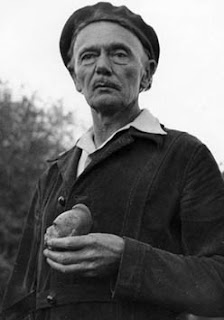Tolkien already knew the art of Virgil Finlay because his American publisher, Houghton Mifflin, had in early 1963 solicited a sample illustration by Finlay for a proposed (but unrealised) illustrated edition of The Hobbit. Tolkien commented on Finlay’s sample in a letter from 11 October 1963, noting that “Though it gives prospects of a general treatment rather heavier and more violent and airless than I should like, I thought it was good, and actually I thought Bilbo's rather rotund and babyish (but anxious) face was in keeping with his character up to that point. After the horrors of the ‘illustrations’ to the translations [of The Hobbit] Mr. Finlay is a welcome relief. As long (as seems likely) he will leave humour to the text and pay reasonable attention to what the text says, I expect I shall be quite happy.”
 |
| Finlay sample for The Hobbit |
Unfortunately, Finlay’s cover and interior illustrations to the anthology are rather undistinguised, and do not showcase Finlay’s talent, perhaps owing to the medium of reproduction in a mass market paperback on cheap paper.
With his copy of the Swords & Sorcery book, Tolkien left some jotted notes, difficult to read (see illustration at bottom). Some bits of these notes are quoted below. His main criticisms of the book he made in a 30 August 1964 letter to de Camp, which has only partially been published. In it, Tolkien noted that he was interested in practically everything save literary criticism, and he said of contemporary fantasy that “I will not pretend that it gave me much pleasure.” In particular about de Camp’s book he noted: “Though I might say, I suppose, as a purely personal aside, that all the items seem poor in the subsidiary (but to me not unimportant) matters of nomenclature. Best when inventive, least good when literary or archaic. (For instance Thangobrind and Alaric, both singularly inapt for their purpose) . . . Also I do wonder why you chose that particular tale of Dunsany’s. It seems to me to illustrate all his faults. And the ghastly final paragraph!”
In his notes, Tolkien had written: “Found [the anthology] interesting but did not much like the stories in it.” Also: “Most of these things are overheated & exaggerated ([?...] bigger or [?would be] bigger, [?’...’] is [?...] than the purposes warrant) Also obviously over or ill-written.”
Of the eight stories, Tolkien commented upon four specifically, with a later conversational comment about a fifth as reported by de Camp. Tolkien did not comment on deCamp’s introduction, nor on the stories by Kuttner, Leiber and Lovecraft. His comments on the four are here considered sequentially, in the order they appear in the book.
“The Valor of Cappen Varra” by Poul Anderson. “Cappen Varra. Nomenclature v. bad. Let us have genuine Scandinavian/Norse ‘barbarians’ or something invented.”
“Distressing Tale of Thangobrind the Jeweller” by Lord Dunsany. “Dunsany at his worst. Trying so hard for the shudder. But not for a moment making the tale ‘credible’ enough to make a background for a strong [?]. And the ending lamentable — in that [?setting]. In a world in which a Thangobrind could even begin to be (let alone Hlo-hlo or [?all the rest]) early 19th century Riviera [?milleau] is surely utterly impossible — or vice versa. And what is meant by selling his daughter’s soul.” And “Dunsany’s is one of his worst. That final ghastly paragraph!”
De Camp suggested that: “I suppose Tolkien meant by ‘ghastly’ Dunsany’s leaving his ‘secondary world’ to drag in a dig at a type of contemporary person he disliked.”
In the first paragraph of the story, Dunsany wrote: “Now there was a Merchant Prince who had come to Thangobrind and had offered his daughter’s soul for the diamond that is larger than the human head and was to be found on the lap of the spider-idol, Hlo-Hlo, in his temple of Moung-ga-ling; for he had heard that Thangobrind was a thief to be trusted.” The final paragraph of the short tale reads:
And the only daughter of the Merchant Prince felt so little gratitude for this great deliverance that she took to respectability of a militant kind, and became aggressively dull, and called her home the English Riviera, and had platitudes worked in worsted upon her tea-cosy, and in the end never died, but passed away at her residence.
“Hellsgarde” by C. L. Moore. “Jirel of Joiry. Does create an atmosphere and [?the] sinister ‘corrupt’ household of Alaric was eerie and credible. But I never [sic] find phantasmal struggles such as that of Jirel with ‘Undead’ Andred quite unconvincing — especially when the victims escape!” And: “Jirel of Joiry [pp.] 140 – 146 is good but needs a deft story (and explanation) to make it valid.”
“The Testament of Athammaus” by Clark Ashton Smith. “The Athammaus monster wholly unbelievable [?…] disgusting [?... ... …]. There are lots of ways of being [?...] nastily, without all this tooraloo of nonsense.”
De Camp met Tolkien in Oxford in February 1967, and de Camp later reported that Tolkien had said he “rather liked” the Conan stories of Robert E. Howard. It is an odd comment, considering that Tolkien had earlier claimed that he did not much like the stories in the book, and there is no evidence to support the idea that he had read any other Conan story. De Camp elaborated this view in a letter to John D. Rateliff on 14 January 1983: “During our conversation, I said something casual to Tolkien about my involvement with Howard’s Conan stories, and he said he ‘rather liked them.’ That was all; we went on to other subjects. I know he had read Swords & Sorcery because I had sent him a copy. I don’t know if he had read any other Conan besides “Shadows in the Moonlight,” but I rather doubt it.”



